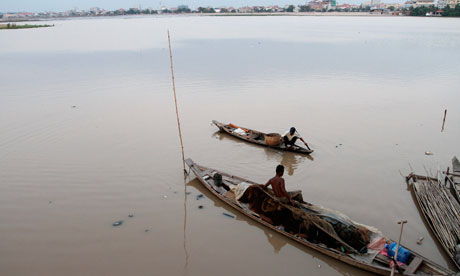
Cambodian PM awards substantial chunk of land earmarked for property development to eviction-threatened locals
Thousands of Cambodians threatened with eviction from land skirting Phnom Penh's Boeung Kak lake have scored a landmark victory, it has emerged.
On 17 August, shortly after the World Bank froze all future loans to Cambodia over plans to allow a property developer to build flats and shops on the land, prime minister Hun Sen - who dislikes aid conditionalities - issued a special sub-decree awarding 12.44 hectares of the land to lakeside residents.
David Pred, Cambodian director of the international NGO Bridges Across Borders, hailed this sudden change of government policy as "a human rights victory that has stopped a massive forced eviction and land grab".
The Shukaku lake development project acquired the 133-hectare (329 acre) Boeung Kak lakeside site from the municipal authorities on a 99-year lease. Lao Meng Khin, the Shukaku director, is closely linked to the prime minister's top cabinet officials.
In March, thousands of residents received eviction notices from the land speculators, clearing the way for a controversial new "city of the east". The plan is to replace a park and urban poor area with a posh residential and leisure complex.
The $98m investment is based on a joint venture agreement with a Chinese investment partner from Inner Mongolia, Erdos Hongjun Investment Corp.
Housing rights activists expressed grave concern that Phnom Penh was being rapidly transformed into an exclusive city for the rich, devoid of public spaces, while the poor were deported to the capital's periphery, where jobs and amenities are non-existent.
What made matters far worse for people protesting the land grab was the complicity of the World Bank's Cambodia Land Management and Administration Project (LMAP), which maps land claims, rights and titles. LMAP agreed with the Cambodian authorities to the arbitrary exclusion of Boeung Kak lake residents from the scheme.
Together with other NGOs, David Pred of Bridges Against Borders filed complaints to the World Bank HQ, prompting an internal audit and investigation. The report, released in March 2011, concluded that "poor management and a lack of monitoring by the World Bank had left thousands of Cambodians at Boeung Kak Lake vulnerable to forced eviction".
This stinging criticism prompted the Cambodia office to change tack and apply pressure on the government to stop further evictions, and provide for on-site land rights, as the condition for future loans.
Civil society views the policy reverse of the World Bank as a landmark achievement. Pred said: "This is what accountability looks like. It is probably the most significant positive outcome that has ever come out of the World Bank's internal accountability process."
It is not a complete victory. Boeun Kak lake, once a popular site for music concerts and picnics, and the most important green space in central Phnom Penh, is all but gone; 90% of it is filled with sand.
Environmental warnings from Cambodia's urban planner Vann Molyvann, who said filling in the lake would aggravate drainage problems and floods during the rainy season, were ignored.
But Pred argues an important principle has been established. "This outcome flies in the face of the conventional wisdom among Cambodia's international donors, who are ever-reluctant to hold the government and themselves accountable, when flawed development projects end up harming people and violating their rights."


No comments:
Post a Comment